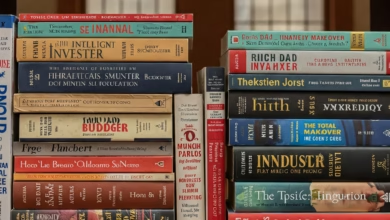What the richest people read about money?
Find out what the richest people are reading about finance

Want to understand how the financially successful think about and manage their wealth? While there’s no single magic formula, examining the reading habits of the wealthiest 1% can offer valuable insights. This article dives into the key topics and types of books that often appear on their reading lists, providing actionable knowledge you can apply to your own financial journey.
Unlocking Financial Wisdom: Books on Investment Strategies of the Wealthy

The affluent don’t just save; they strategically invest. Their bookshelves often contain classics and contemporary guides on diverse investment approaches. Think beyond basic stock market advice. They delve into:
- Value Investing: Understanding the principles outlined in seminal works like Benjamin Graham’s “The Intelligent Investor” helps them identify undervalued assets for long-term growth.
- Diversification and Asset Allocation: Books emphasizing the importance of spreading investments across various asset classes (stocks, bonds, real estate, alternatives) are crucial for risk management and consistent returns.
- Understanding Market Cycles: Works that analyze historical market trends and economic indicators empower them to make informed decisions and capitalize on opportunities.
Actionable Takeaway: Explore books that delve into different investment philosophies and the importance of diversification to build a resilient portfolio.
Mastering the Mindset of Millionaires: Psychology of Money and Wealth Accumulation
Becoming wealthy isn’t just about numbers; it’s deeply intertwined with psychology. The wealthiest often read books that explore the behavioral aspects of money, including:
- Overcoming Cognitive Biases: Understanding how emotions and biases can cloud financial judgment is essential for making rational decisions. Books on behavioral economics offer valuable insights.
- Developing a Long-Term Perspective: Cultivating patience and focusing on long-term goals, rather than short-term gains, is a common theme in their reading.
- Cultivating a Growth Mindset: Embracing challenges, learning from setbacks, and continuously seeking knowledge are crucial for sustained financial success.
Actionable Takeaway: Look for books that explore the psychological aspects of wealth building and help you develop a healthier relationship with money.
Strategic Financial Planning: The Cornerstones of Wealth Management

The wealthy understand that preserving and growing wealth requires meticulous planning. Their reading often includes books on:
- Estate Planning and Wealth Transfer: Ensuring their assets are protected and passed on efficiently to future generations is a key concern. Books on estate planning, trusts, and inheritance laws are common.
- Tax Optimization Strategies: Understanding tax implications and implementing strategies to minimize liabilities is crucial for maximizing net worth.
- Long-Term Financial Goal Setting: Books that guide the process of defining and achieving ambitious financial goals, such as early retirement or philanthropic endeavors, are frequently consulted.
Actionable Takeaway: Research books that cover estate planning, tax efficiency, and long-term financial planning to build a solid foundation for your financial future.
Beyond the Basics: Exploring Alternative Investments and Wealth Preservation
For the ultra-wealthy, the reading list often extends beyond traditional investments. They might explore:
- Real Estate Ventures: Books on property investment, development, and management are often found in their libraries.
- Private Equity and Venture Capital: Understanding how these less liquid but potentially high-growth asset classes work is important for sophisticated investors.
- Philanthropy and Impact Investing: Many wealthy individuals are interested in using their resources for social good, leading them to read about effective giving strategies and impact investing.
Actionable Takeaway: While these areas might seem advanced, understanding the principles behind alternative investments and wealth preservation can broaden your financial perspective.

While access to the same resources doesn’t guarantee the same outcomes, understanding what the wealthiest people read about money can provide a valuable roadmap for your own financial journey. By exploring topics like investment strategies, the psychology of wealth, strategic financial planning, and alternative investments, you can gain insights that empower you to make more informed decisions and work towards your own financial goals. Start building your own “1% Reading List” today!





